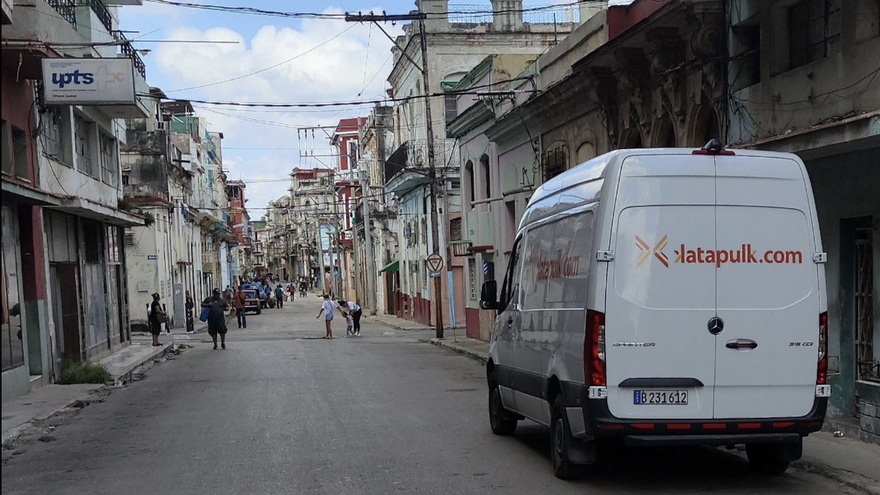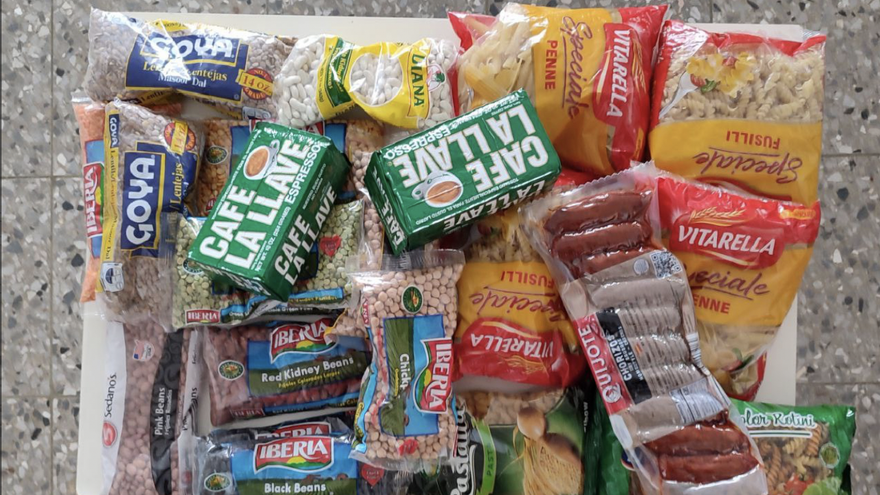
![]() 14ymedio, Havana, 30 December 2023 — Two bottles of oil, Gouda cheese, 10 pounds of white sugar and a pork leg top the list of food Yoel bought for his family in Cuba this New Year’s Eve from Miami. The Cuban émigré laments, “it’s the same story every December, since 2015”. Without their sacrifice, however, their relatives’ Christmas celebrations in Havana “would be sadder than they already are”.
14ymedio, Havana, 30 December 2023 — Two bottles of oil, Gouda cheese, 10 pounds of white sugar and a pork leg top the list of food Yoel bought for his family in Cuba this New Year’s Eve from Miami. The Cuban émigré laments, “it’s the same story every December, since 2015”. Without their sacrifice, however, their relatives’ Christmas celebrations in Havana “would be sadder than they already are”.
“This list is just the one that’s meant for my mom. I have to add what I send to my children,” he tells 14ymedio. According to his estimates, the purchases he made through the Katapulk online store amount to almost $400. “I also sent a dozen bottles of beer and a cake, because, if not, it doesn’t feel like a celebration and you always want them to enjoy it”, he says.
“Every year when December approaches I start putting together money to buy food for Cuba. This year, however, the situation was worse, because everything is more expensive and there is nothing there. Before, at least one would send money, and since there was not much inflation or shortages, the family itself could get the ingredients for Christmas Eve or New Year’s Eve dinner, plus something that one would buy in virtual stores”, Yoel recalls.
Every end of year’s he tries to send food to his family in Villa Clara so they can have a “decent” holiday
“My brother made his purchase through Cubamax, which has a sales method that allows people who are getting the package to choose the food they want. Coffee, chorizo, pasta, and all kinds of legumes – lentils, red beans, white beans and peas – was what they asked for. It amounted to 22 pounds of things that haven’t been seen in Cuba for a long time,” he adds.
The situation of Leticia, who has lived in Spain for five years, is similar. Every year’s end she tries to send food to her family in Villa Clara so they can experience “decent” festivities. “This year I bought two pork legs of more than 20 pounds each, for my in-laws’ house and my father’s. My brother from the United States helped me by sending a box of beer and some sweets. In total, everything worked out for us at about 200 euros,” she tells this newspaper.
Since her arrival in the Spain, Leticia has explored different ways to send to Cuba what she buys for her family. “Finally, I send everything I can with friends, and in these cases, I buy things in Miami through my brother, because everything is more expensive from here. I also look for individuals who sell the food within the country and deliver it at home, because in virtual stores they bleed you dry,” she says.
Leticia acknowledges that she is upset that all the money she sends or spends on food for her family “ends up in the hands of the Government”, but at the same time she considers that it would be “very painful” if her family could not enjoy that day of peace. “That is another reason to buy from individuals, but it also has its pitfalls. If you start to think about where they get the pigs they kill, the beer, the cheeses and everything else they sell, you realize that you are probably buying stolen food from some state warehouse or some hotel”, she says.
At the end of the year, she continues, everyone who sells food in Cuba “becomes rich.” “This time, the person who sold me the hams told me that I had to wait several days for mine to be distributed, because he had a long list of people in front of me. In the end, the meat arrived on December 24,” she says.
Irene, another Cuban from Holguín who came to Mexico with a scholarship to pursue a master’s degree, tells 14ymedio about the challenge of sending food to her family by the end of the year. “They don’t pay me much because of the scholarship, so I always prioritize buying items that last, like clothes, shoes or medicine. This way my parents can use all their money to buy food”, she explains.

At the end of the year, however, “things change, because, in Cuba, we have a tradition of getting together with relatives and celebrating by eating congrí (a traditional dish of rice and beans cooked together), roast pork meat and opening at least one bottle of cider. There is none of that in Cuba, and “you want your family to have a good time despite everything, so you end up spending an arm and a leg”, she continues.
From Guadalajara, where Irene resides, shipments cost about 350 Mexican pesos per kilogram (about $20), in addition to whatever must be paid for the product being sent. “Things are cheaper here than in Mexico City, for instance, but the expense is still enormous”, she says.
This year, Irene has noticed a peculiarity among her friends who also send food to Cuba. “Everyone is sending rice and beans. That is something that I had never seen done before, because sending a kilogram of rice costs more than 20 dollars and it’s barely enough for a meal for four people,” she reflects.
To this she must add the cost of delivering products outside the capital, which she adds another 700 Mexican pesos ($41) to the bill. “With that amount I can buy two weeks’ worth of food in Mexico”, she compares. “At least from here the shipping is direct. From other states, where there is no one traveling to Cuba, you have to pay extra to send things to a big city”, she asserts.
“We emigrants have started supporting those who stay there. If previously we bought what they didn’t have – shoes, clothes, or a recharge for the phone – now the need for everything in Cuba is covered by the Cuban community abroad,” she adds. “I will also be sending Three Kings’ Day gifts for the children this January”.
Translated by Norma Whiting
____________
COLLABORATE WITH OUR WORK: The 14ymedio team is committed to practicing serious journalism that reflects Cuba’s reality in all its depth. Thank you for joining us on this long journey. We invite you to continue supporting us by becoming a member of 14ymedio now. Together we can continue transforming journalism in Cuba.
